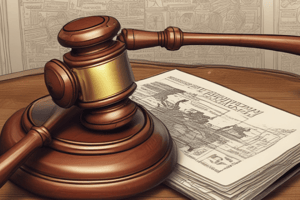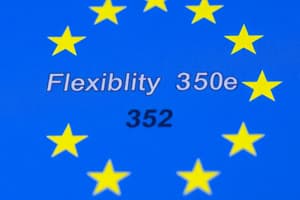Podcast
Questions and Answers
What is the main purpose of the Treaty on the Functioning of the European Union (TFEU)?
What is the main purpose of the Treaty on the Functioning of the European Union (TFEU)?
- To establish the EU's fundamental values and principles.
- To outline the process of expanding the EU through new member states.
- To define the specific operational mechanisms and policies of the EU. (correct)
- To provide guidance for resolving disputes between member states
Which of the following policy areas is not primarily regulated by the TFEU?
Which of the following policy areas is not primarily regulated by the TFEU?
- Economic policy and competition
- Justice and home affairs, including immigration
- Social policy and environmental protection
- Foreign relations and defense (correct)
How does the TFEU relate to the Treaty on European Union (TEU)?
How does the TFEU relate to the Treaty on European Union (TEU)?
- The TEU is a more recent treaty that replaced the TFEU.
- The TFEU complements the TEU by providing specific details and operational rules for the EU. (correct)
- The TFEU and TEU are unrelated treaties with distinct areas of responsibility.
- The TFEU supersedes the TEU as the primary source of EU law.
What is the main difference between primary and secondary law in the EU legal order?
What is the main difference between primary and secondary law in the EU legal order?
Which of the following is NOT a characteristic of the Treaty on the Functioning of the European Union (TFEU)?
Which of the following is NOT a characteristic of the Treaty on the Functioning of the European Union (TFEU)?
Which of the following best describes the analogy provided for the TFEU?
Which of the following best describes the analogy provided for the TFEU?
Which of the following is NOT a source of primary law in the EU?
Which of the following is NOT a source of primary law in the EU?
What is the significance of the TFEU replacing previous treaties like the Maastricht and Rome treaties?
What is the significance of the TFEU replacing previous treaties like the Maastricht and Rome treaties?
Which of the following types of EU law are considered non-binding? (Select all that apply)
Which of the following types of EU law are considered non-binding? (Select all that apply)
What is the key difference between Regulations and Directives in terms of their applicability within EU member states?
What is the key difference between Regulations and Directives in terms of their applicability within EU member states?
Which of the following is NOT a type of violation of EU law as discussed in the provided content?
Which of the following is NOT a type of violation of EU law as discussed in the provided content?
The 'Primacy of EU Law' principle, as established in the Costa v ENEL case, implies that:
The 'Primacy of EU Law' principle, as established in the Costa v ENEL case, implies that:
What is the significance of the Van Gend en Loos case in the context of EU law?
What is the significance of the Van Gend en Loos case in the context of EU law?
Which of the following examples best illustrates a 'Non-Conformity of Transposition' violation of EU law?
Which of the following examples best illustrates a 'Non-Conformity of Transposition' violation of EU law?
Which of the following is an example of a directly applicable EU law instrument? (Select all that apply)
Which of the following is an example of a directly applicable EU law instrument? (Select all that apply)
What is the main difference between 'Non-Notification of Transposition' and 'Non-Conformity of Transposition' violations?
What is the main difference between 'Non-Notification of Transposition' and 'Non-Conformity of Transposition' violations?
Which of these groups are most likely to hold Eurosceptic views?
Which of these groups are most likely to hold Eurosceptic views?
What is the main argument of the 'Elite Perspective & Cue-Taking' explanation for Euroscepticism?
What is the main argument of the 'Elite Perspective & Cue-Taking' explanation for Euroscepticism?
Which of the following accurately describes the 'Inverted-U Model' of Euroscepticism?
Which of the following accurately describes the 'Inverted-U Model' of Euroscepticism?
How does the text position Euroscepticism in relation to the 'Cultural Dimension' of the 2-Dimensional Party System?
How does the text position Euroscepticism in relation to the 'Cultural Dimension' of the 2-Dimensional Party System?
Which of the following examples demonstrates the evolution of Euroscepticism in recent years?
Which of the following examples demonstrates the evolution of Euroscepticism in recent years?
Which of the following is NOT a factor that the text identifies as a key driver of Euroscepticism?
Which of the following is NOT a factor that the text identifies as a key driver of Euroscepticism?
What is one of the key reasons for the rise of Euroscepticism among radical left parties?
What is one of the key reasons for the rise of Euroscepticism among radical left parties?
What is the primary reason, according to the text, for the shift in focus of some radical right parties toward migration and sovereignty?
What is the primary reason, according to the text, for the shift in focus of some radical right parties toward migration and sovereignty?
Which of the following is NOT a purpose of EU enlargement?
Which of the following is NOT a purpose of EU enlargement?
What is the main reason why treaty reforms are often politically sensitive?
What is the main reason why treaty reforms are often politically sensitive?
Which of the following is a characteristic of the simplified revision procedure?
Which of the following is a characteristic of the simplified revision procedure?
What is the primary purpose of 'passerelle clauses' in EU treaties?
What is the primary purpose of 'passerelle clauses' in EU treaties?
Why are passerelle clauses rarely used despite being easier than full treaty reform?
Why are passerelle clauses rarely used despite being easier than full treaty reform?
Why was the European Constitution rejected in 2005?
Why was the European Constitution rejected in 2005?
Which of the following is NOT a factor that makes treaty reform difficult?
Which of the following is NOT a factor that makes treaty reform difficult?
What does the term 'enlargement' refer to in the context of the EU?
What does the term 'enlargement' refer to in the context of the EU?
According to the provided content, which of the following is NOT a primary goal of interest groups?
According to the provided content, which of the following is NOT a primary goal of interest groups?
Which consultation instrument is most likely to involve a significant number of NGOs and citizens?
Which consultation instrument is most likely to involve a significant number of NGOs and citizens?
Which type of interest group is most likely to dominate specialized forums within EU consultations?
Which type of interest group is most likely to dominate specialized forums within EU consultations?
Which of the following is NOT a characteristic of the "venue shopping" strategy used by interest groups?
Which of the following is NOT a characteristic of the "venue shopping" strategy used by interest groups?
Which of the following is an example of an "outsider" strategy?
Which of the following is an example of an "outsider" strategy?
Which of the following is an argument against the idea that policy influence is the main goal of lobbying?
Which of the following is an argument against the idea that policy influence is the main goal of lobbying?
According to the content, which of the following interest group types is most likely to be involved in lobbying for climate regulations?
According to the content, which of the following interest group types is most likely to be involved in lobbying for climate regulations?
What is the main takeaway regarding EU consultations from the study by Binderkrantz et al. (2011-2016)?
What is the main takeaway regarding EU consultations from the study by Binderkrantz et al. (2011-2016)?
What is the main research question investigated by Hobolt and Wittrock in their study?
What is the main research question investigated by Hobolt and Wittrock in their study?
What is the main finding of Hobolt and Wittrock's research on voter behavior in EP elections?
What is the main finding of Hobolt and Wittrock's research on voter behavior in EP elections?
Which statement best summarizes the relationship between Hobolt and Wittrock's findings and the Second-Order Model?
Which statement best summarizes the relationship between Hobolt and Wittrock's findings and the Second-Order Model?
Which of the following accurately describes the Spitzenkandidaten system?
Which of the following accurately describes the Spitzenkandidaten system?
Which of the following is NOT a criticism of the Spitzenkandidaten system?
Which of the following is NOT a criticism of the Spitzenkandidaten system?
Based on the content provided, what is the significance of the 2019 EP elections?
Based on the content provided, what is the significance of the 2019 EP elections?
Which of the following is a key factor that influences voter choice in EP elections, as indicated by the content?
Which of the following is a key factor that influences voter choice in EP elections, as indicated by the content?
What is the primary purpose of the European Council in relation to the Spitzenkandidaten system?
What is the primary purpose of the European Council in relation to the Spitzenkandidaten system?
Flashcards
TFEU
TFEU
Treaty on the Functioning of the European Union, detailing EU operations.
Purpose of TFEU
Purpose of TFEU
To provide detailed rules on how the EU operates in specific policy areas.
Key Policies in TFEU
Key Policies in TFEU
Regulates policies like Single Market, Monetary Policy, Social Policy, Justice.
EU Powers
EU Powers
Signup and view all the flashcards
EU’s Legislative Process
EU’s Legislative Process
Signup and view all the flashcards
TEU
TEU
Signup and view all the flashcards
Primary Law
Primary Law
Signup and view all the flashcards
TFEU & TEU Relationship
TFEU & TEU Relationship
Signup and view all the flashcards
Political Resistance
Political Resistance
Signup and view all the flashcards
Euroskeptic Movements
Euroskeptic Movements
Signup and view all the flashcards
Simplified Revision Procedure
Simplified Revision Procedure
Signup and view all the flashcards
Passerelle Clauses
Passerelle Clauses
Signup and view all the flashcards
Unanimity Requirement
Unanimity Requirement
Signup and view all the flashcards
Lengthy Process
Lengthy Process
Signup and view all the flashcards
Enlargement
Enlargement
Signup and view all the flashcards
Purpose of Enlargement
Purpose of Enlargement
Signup and view all the flashcards
Influence Policy
Influence Policy
Signup and view all the flashcards
Mobilization & Recruitment
Mobilization & Recruitment
Signup and view all the flashcards
Public Image
Public Image
Signup and view all the flashcards
Compete or Cooperate
Compete or Cooperate
Signup and view all the flashcards
Open Consultations
Open Consultations
Signup and view all the flashcards
Insider Strategies
Insider Strategies
Signup and view all the flashcards
Outsider Strategies
Outsider Strategies
Signup and view all the flashcards
Venue Shopping
Venue Shopping
Signup and view all the flashcards
Voter Turnout Variation
Voter Turnout Variation
Signup and view all the flashcards
Recent Turnout Trends
Recent Turnout Trends
Signup and view all the flashcards
Factors Influencing Voter Choice
Factors Influencing Voter Choice
Signup and view all the flashcards
EU Policy Awareness
EU Policy Awareness
Signup and view all the flashcards
Spitzenkandidaten System
Spitzenkandidaten System
Signup and view all the flashcards
Election Influence Mechanism
Election Influence Mechanism
Signup and view all the flashcards
Voter Recognition Issues
Voter Recognition Issues
Signup and view all the flashcards
Criticism of Spitzenkandidaten
Criticism of Spitzenkandidaten
Signup and view all the flashcards
Regulations
Regulations
Signup and view all the flashcards
Directives
Directives
Signup and view all the flashcards
Decisions
Decisions
Signup and view all the flashcards
Recommendations
Recommendations
Signup and view all the flashcards
Direct Effect
Direct Effect
Signup and view all the flashcards
Primacy of EU Law
Primacy of EU Law
Signup and view all the flashcards
Non-Notification of Transposition
Non-Notification of Transposition
Signup and view all the flashcards
Non-Conformity of Transposition
Non-Conformity of Transposition
Signup and view all the flashcards
Cultural Identity Perspective
Cultural Identity Perspective
Signup and view all the flashcards
Economic Factors in Euroscepticism
Economic Factors in Euroscepticism
Signup and view all the flashcards
Elite Perspective
Elite Perspective
Signup and view all the flashcards
Inverted-U Model of Euroscepticism
Inverted-U Model of Euroscepticism
Signup and view all the flashcards
2-Dimensional Party System
2-Dimensional Party System
Signup and view all the flashcards
Party Positions on EU
Party Positions on EU
Signup and view all the flashcards
Centrists' EU Stance
Centrists' EU Stance
Signup and view all the flashcards
Migration and Euroscepticism
Migration and Euroscepticism
Signup and view all the flashcards
Study Notes
Policymaking in the European Union
- The Treaty on European Union (TEU) and the Treaty on the Functioning of the European Union (TFEU) are the EU's primary treaties.
- The TEU establishes fundamental principles, values, and framework for the EU.
- The TFEU provides detailed rules for the EU's functioning in specific policy areas.
- Primary law is the highest legal authority in the EU.
- Secondary law implements and enforces primary law.
Treaty Reform
- Ordinary Revision Procedure (Major Treaty Reform): Used for major reforms affecting fundamental aspects of the EU. A proposal is submitted, usually followed by a Convention or Intergovernmental Conference (IGC) to discuss and finalize the text. All member states must agree and ratify the treaty.
- Simplified Revision Procedure (Limited Treaty Reform): Used for smaller reforms affecting internal EU policies. A proposal is submitted, the European Council decides by unanimity after consultation with the Commission and Parliament, and all member states must ratify.
Enlargement and Neighbourhood Policy
- Enlargement is the process by which countries join the EU following specific criteria, rules, and negotiations.
- Current and candidate countries are generally located in Eastern & Central Europe and Western Balkans.
- Copenhagen Criteria (1993) outline membership conditions, including stable political institutions, a functioning market economy, and ability to adopt EU law.
- The Accession Process involves applications, screening, candidate status, negotiations, interim & closing benchmarks, and ratification by EU member countries.
- Transition periods are common (e.g., free movement of workers, Schengen membership, Euro zone) to ease the process.
The European Council & Council of the EU
- The European Council (EuCo) consists of Heads of State or Government of EU member states, providing high-level political guidance.
- The Council of the EU represents national governments at the ministerial level in various policy areas (e.g., ECOFIN, Agriculture & Fisheries Council).
- The Council's role includes legislative power (co-legislator with the European Parliament), budget approval, and handling high-stakes issues.
- The Council Presidency rotates every six months among EU member states.
- Bargaining power in the EU Council is determined by factors such as institutional power resources, structural power resources, negotiation tactics, and information advantage.
The European Parliament & Decision-Making
- The European Parliament (EP) has 705 Members of the European Parliament (MEPs) elected directly by EU Citizens every 5 years, and is the legislative body of the EU.
- The EP plays a role in the legislative process (co-legislator with the Council), approving EU budgets, and overseeing EU activities.
- The EP employs committees and rapporteurs for in-depth discussions of legislative topics and to coordinate policies with governments and parties.
Interest Groups & Lobbying in the EU
- Interest groups (NGOs) attempt to influence EU policy without standing for election.
- Interest groups have various motivations (organizational survival, influencing policies, mobilization, public image, competition).
- Some groups use insider strategies (direct lobbying), others use outsider strategies (public mobilization and campaigns).
- Policymakers listen to interest groups due to needing technical expertise, building support within policy areas, complying with regulations, and ensuring proper implementation of policies.
Inter-Institutional Relations in the EU
- Key examples of inter-institutional relations in the EU include treaty reforms, EU enlargement processes , high-level appointments such as the Commission President and Commissioners, and legislative procedures such as the Ordinary Legislative Procedure (OLP).
- The OLP is the primary way EU laws are made, and involves the Commission proposing laws, the EP and Council amending and debating the laws, and the Council formally approving any proposed changes. Consensual solutions are preferred.
- The Commission is crucial for initiating legislation but its power is limited as the Council and Parliament have significant influence.
Euroscepticism in the EU
- Euroscepticism is criticism or opposition towards the European Union.
- Euroscepticism has different types (hard and soft) and diverse opinions which stem from various factors (economic, identity, and political considerations).
- There have been times of high Euroscepticism and declining levels of backing towards the EU.
Democratic Backsliding in the EU
- Democratic backsliding refers to the gradual weakening of democratic institutions and norms, often led by elected governments.
- Key features include erosion of judicial independence, restriction on media freedom, weakening of civil society, politicization of public administration, and manipulation of electoral rules.
- The EU (and member states) have faced challenges in preventing or appropriately addressing democratic backsliding through legal policies and processes.
Sample Question (European Commission)
- The European Commission holds significant agenda-setting power in the ordinary legislative procedure due to its exclusive right of legislative initiative.
- However, political pressure, parliamentary and council constraints significantly limit the Commission's power and influence over the legislative outcomes.
Studying That Suits You
Use AI to generate personalized quizzes and flashcards to suit your learning preferences.




